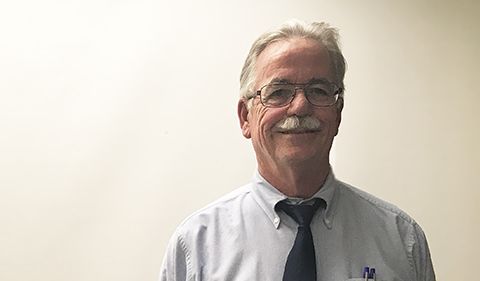
David Stebbins
by Aissatou Boye ’20
David Stebbins, Assistant Federal Public Defender for the Southern District of Ohio, joined Amanda Cox’s Sociology Capstone class last fall to talk about his experience working with capital defendants in Ohio.
He went to Denison University for his undergraduate studies and then went on to receive his law degree at Cleveland-Marshall Law School at Cleveland State University.
Stebbins explained why he works with capital defendants.
“It is a bad idea for the government to be executing its citizens. The system doesn’t work because they haven’t been able to pick out the worst of the worst and many innocent people are being killed. The system is outdated and a general vestige of the old Jim Crow in the South, a carry-over of that,” he said.
He is extremely qualified on this topic being a lawyer for 40 years and doing capital defense work for 35 years. Now doing death penalty litigation, he has seen the impact of the death penalty on many groups of people.
He describes what life is like for someone on death row, emphasizing their isolation for 23 hours a day and the constant high risk security. Many of the death row inmates suffer from mental illness, including depression and schizophrenia, along with many other conditions that do not improve with isolation. Stebbins says that “solitary confinement literally drives men mad” after seeing many instances of this firsthand.
Stebbins is not the only defense attorney who has seen the impact of death row on his own clients and other inmates; many attorneys become close with these clients. This point impressed at least two members of the capstone class.
“I learned a few pieces of information that I had not known before,” says Ashley Bowe 18, a Sociology-Criminology major with a minor in Psychology, “such as the level of involvement that defense attorneys have with their clients, they develop very personal relationships. I also learned that Ohio’s death row is a little better than the rest, in regards to their conditions in the prison.”
Matthew Shipman ’17, an Economics and Sociology major, agreed.
“I found the most valuable aspect of Mr. Stebbin’s talk to be his firsthand stories that he has about his clients. I learned about the emotional toll that occurs to defense attorneys after they lose a case, which is an aspect of the death penalty that I have not thought a lot about before. Mr. Stebbin’s talk reinforced my belief that the death penalty should be abolished.”
Along with attorneys, there is a “serious toll on executioners, administrators, parole boards and more,” Stebbins said, also talking about the toll on the family of the inmate along with the family of the victim.
Death row is a controversial topic, and Stebbins mentions how even on the day of an execution there are “always people in the parking lot who are protesting.”
One of the reasons Stebbins has problems with the death penalty is that “our systems [are] not capable of being right every time.” He illustrates this point with data: nine exonerations in Ohio and 72 across the country in the last 20 years. He also mentioned how there are huge racial, gender, and socio-economic disparities.
Another student in this capstone, Taylor Rudolph ’19, a Sociology-Criminology major, said that Stebbins’s talk on the death penalty made her view many things in a different way.
“I started to realize that there are many problems with capital punishment and our criminal justice system, and along with Mr. Stebbins, I don’t believe there is a way to completely fix it without abolishing the death penalty.”
Stebbins wrapped up his talk by saying the “death penalty should be reserved for the worst of the worst and not those with the worst lawyers.”



















Comments